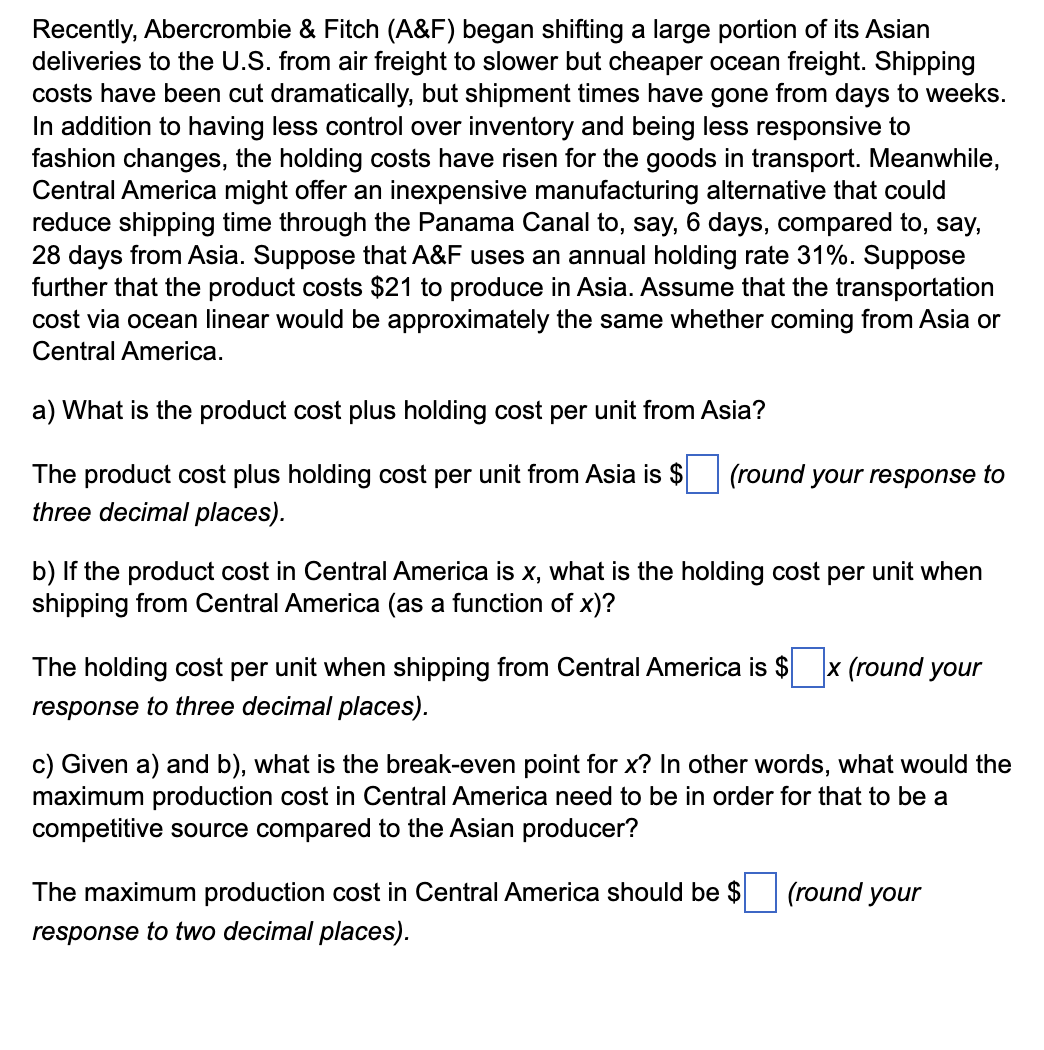Recently, Abercrombie & Fitch (A&F) began shifting a large portion of its Asian deliveries to the U.S. from air freight to slower but cheaper ocean freight. Shipping costs have been cut dramatically, but shipment times have gone from days to weeks. In addition to having less control over inventory and being less responsive to fashion changes, the holding costs have risen for the goods in transport. Meanwhile, Central America might offer an inexpensive manufacturing alternative that could reduce shipping time through the Panama Canal to, say, 6 days, compared to, say, 28 days from Asia. Suppose that A&F uses an annual holding rate 31%. Suppose further that the product costs $21 to produce in Asia. Assume that the transportation cost via ocean linear would be approximately the same whether coming from Asia or Central America.
Recently, Abercrombie & Fitch (A&F) began shifting a large portion of its Asian deliveries to the U.S. from air freight to slower but cheaper ocean freight. Shipping costs have been cut dramatically, but shipment times have gone from days to weeks. In addition to having less control over inventory and being less responsive to fashion changes, the holding costs have risen for the goods in transport. Meanwhile, Central America might offer an inexpensive manufacturing alternative that could reduce shipping time through the Panama Canal to, say, 6 days, compared to, say, 28 days from Asia. Suppose that A&F uses an annual holding rate 31%. Suppose further that the product costs $21 to produce in Asia. Assume that the transportation cost via ocean linear would be approximately the same whether coming from Asia or Central America.
Practical Management Science
6th Edition
ISBN:9781337406659
Author:WINSTON, Wayne L.
Publisher:WINSTON, Wayne L.
Chapter2: Introduction To Spreadsheet Modeling
Section: Chapter Questions
Problem 20P: Julie James is opening a lemonade stand. She believes the fixed cost per week of running the stand...
Related questions
Question

Transcribed Image Text:Recently, Abercrombie & Fitch (A&F) began shifting a large portion of its Asian
deliveries to the U.S. from air freight to slower but cheaper ocean freight. Shipping
costs have been cut dramatically, but shipment times have gone from days to weeks.
In addition to having less control over inventory and being less responsive to
fashion changes, the holding costs have risen for the goods in transport. Meanwhile,
Central America might offer an inexpensive manufacturing alternative that could
reduce shipping time through the Panama Canal to, say, 6 days, compared to, say,
28 days from Asia. Suppose that A&F uses an annual holding rate 31%. Suppose
further that the product costs $21 to produce in Asia. Assume that the transportation
cost via ocean linear would be approximately the same whether coming from Asia or
Central America.
a) What is the product cost plus holding cost per unit from Asia?
The product cost plus holding cost per unit from Asia is $
three decimal places).
(round your response to
b) If the product cost in Central America is x, what is the holding cost per unit when
shipping from Central America (as a function of x)?
The holding cost per unit when shipping from Central America is $ x (round your
response to three decimal places).
c) Given a) and b), what is the break-even point for x? In other words, what would the
maximum production cost in Central America need to be in order for that to be a
competitive source compared to the Asian producer?
The maximum production cost in Central America should be $
response to two decimal places).
(round your
Expert Solution
This question has been solved!
Explore an expertly crafted, step-by-step solution for a thorough understanding of key concepts.
Step by step
Solved in 5 steps with 5 images

Recommended textbooks for you

Practical Management Science
Operations Management
ISBN:
9781337406659
Author:
WINSTON, Wayne L.
Publisher:
Cengage,

Operations Management
Operations Management
ISBN:
9781259667473
Author:
William J Stevenson
Publisher:
McGraw-Hill Education

Operations and Supply Chain Management (Mcgraw-hi…
Operations Management
ISBN:
9781259666100
Author:
F. Robert Jacobs, Richard B Chase
Publisher:
McGraw-Hill Education

Practical Management Science
Operations Management
ISBN:
9781337406659
Author:
WINSTON, Wayne L.
Publisher:
Cengage,

Operations Management
Operations Management
ISBN:
9781259667473
Author:
William J Stevenson
Publisher:
McGraw-Hill Education

Operations and Supply Chain Management (Mcgraw-hi…
Operations Management
ISBN:
9781259666100
Author:
F. Robert Jacobs, Richard B Chase
Publisher:
McGraw-Hill Education


Purchasing and Supply Chain Management
Operations Management
ISBN:
9781285869681
Author:
Robert M. Monczka, Robert B. Handfield, Larry C. Giunipero, James L. Patterson
Publisher:
Cengage Learning

Production and Operations Analysis, Seventh Editi…
Operations Management
ISBN:
9781478623069
Author:
Steven Nahmias, Tava Lennon Olsen
Publisher:
Waveland Press, Inc.